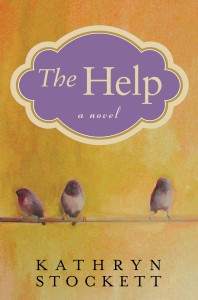Allison Janney (Juno, The West Wing) has joined Viola Davis, Octavia Spencer and Bryce Dallas Howard for The Help, DreamWorks’ upcoming film adaptation of Kathryn Stockett’s best-selling novel. Janney will play Emma Stone’s mother in the film, about upper-class women in 1960’s Mississippi whose poor treatment of their black maids becomes the subject of a hard-hitting book.
Book Jacket:
Three ordinary women are about to take one extraordinary step.
Twenty-two-year-old Skeeter has just returned home after graduating from Ole Miss. She may have a degree, but it is 1962, Mississippi, and her mother will not be happy till Skeeter has a ring on her finger. Skeeter would normally find solace with her beloved maid Constantine, the woman who raised her, but Constantine has disappeared and no one will tell Skeeter where she has gone.
Aibileen is a black maid, a wise, regal woman raising her seventeenth white child. Something has shifted inside her after the loss of her own son, who died while his bosses looked the other way. She is devoted to the little girl she looks after, though she knows both their hearts may be broken.
Minny, Aibileen’s best friend, is short, fat, and perhaps the sassiest woman in Mississippi. She can cook like nobody’s business, but she can’t mind her tongue, so she’s lost yet another job. Minny finally finds a position working for someone too new to town to know her reputation. But her new boss has secrets of her own.
Seemingly as different from one another as can be, these women will nonetheless come together for a clandestine project that will put them all at risk. And why? Because they are suffocating within the lines that define their town and their times. And sometimes lines are made to be crossed.
In pitch-perfect voices, Kathryn Stockett creates three extraordinary women whose determination to start a movement of their own forever changes a town, and the way women–mothers, daughters, caregivers, friends–view one another. A deeply moving novel filled with poignancy, humor, and hope, The Help is a timeless and universal story about the lines we abide by, and the ones we don’t.
Critics say (of the book):
“What perfect timing for this optimistic, uplifting debut novel (and maiden publication of Amy Einhorn’s new imprint) set during the nascent civil rights movement in Jackson, Miss., where black women were trusted to raise white children but not to polish the household silver. Eugenia “Skeeter” Phelan is just home from college in 1962, and, anxious to become a writer, is advised to hone her chops by writing “about what disturbs you.” The budding social activist begins to collect the stories of the black women on whom the country club sets relies–and mistrusts–enlisting the help of Aibileen, a maid who’s raised 17 children, and Aibileen’s best friend Minny, who’s found herself unemployed more than a few times after mouthing off to her white employers. The book Skeeter puts together based on their stories is scathing and shocking, bringing pride and hope to the black community, while giving Skeeter the courage to break down her personal boundaries and pursue her dreams. Assured and layered, full of heart and history, this one has bestseller written all over it.”
– Publishers Weekly (starred review)
Set in Stockett’s native Jackson, MS, in the early 19060s, this first novel adopts the complicated theme of blacks and whites living in a segregated South. A century after the Emancipation Proclamation, black maids raised white children and ran households but were paid poorly, often had to use separate toilets from the family, and watched the children they cared for commit bigotry. In Stockett’s narrative, Miss Skeeter, a young white woman, is a naive, aspiring writer who wants to create a series of interviews with local black maids. Even if they’re published anonymously, the risk is great; still, Aibileen and Minny agree to participate. Tension pervades the novel as its event are told by these three memorable women. Is this an easy book to read? No, but it is surely worth reading. It may even stir things up as readers in Jackson and beyond question their own discrimination and intolerance in the past and present.
– Library Journal (Starred Review)
You can read an excerpt here:







Leave a Reply